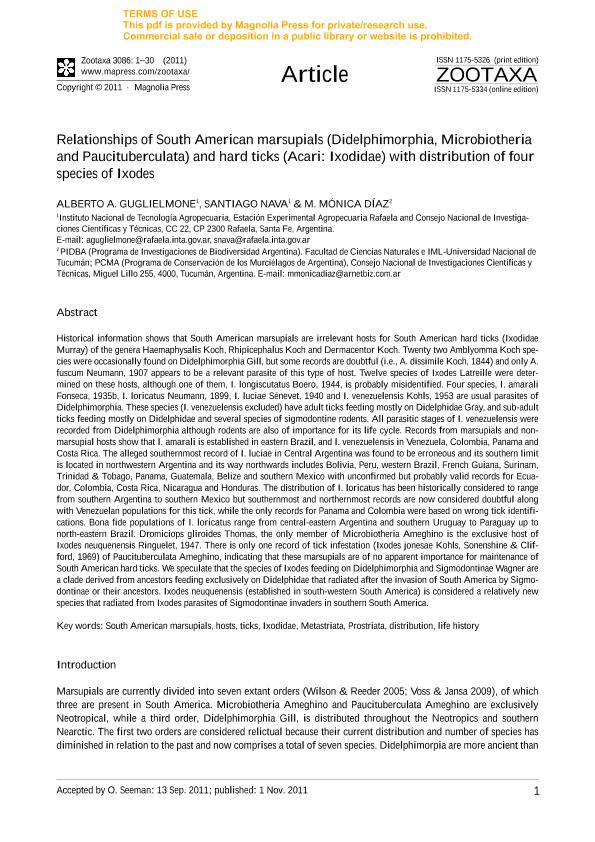Mostrar el registro sencillo del ítem
dc.contributor.author
Guglielmone, Alberto Alejandro

dc.contributor.author
Nava, Santiago

dc.contributor.author
Díaz, María Mónica

dc.date.available
2019-03-20T20:46:04Z
dc.date.issued
2011-11
dc.identifier.citation
Guglielmone, Alberto Alejandro; Nava, Santiago; Díaz, María Mónica; Relationships of South American marsupials (Didelphimorphia, Microbiotheria and Paucituberculata) and hard ticks (Acari: Ixodidae) with distribution of four species of Ixodes; Magnolia Press; Zootaxa; 3086; 1; 11-2011; 1-30
dc.identifier.issn
1175-5326
dc.identifier.uri
http://hdl.handle.net/11336/72162
dc.description.abstract
Historical information shows that South American marsupials are irrelevant hosts for South American hard ticks (Ixodidae Murray) of the genera Haemaphysalis Koch, Rhipicephalus Koch and Dermacentor Koch. Twenty two Amblyomma Koch species were occasionally found on Didelphimorphia Gill, but some records are doubtful (i.e., A. dissimile Koch, 1844) and only A. fuscum Neumann, 1907 appears to be a relevant parasite of this type of host. Twelve species of Ixodes Latreille were determined on these hosts, although one of them, I. longiscutatus Boero, 1944, is probably misidentified. Four species, I. amarali Fonseca, 1935b, I. loricatus Neumann, 1899, I. luciae Sénevet, 1940 and I. venezuelensis Kohls, 1953 are usual parasites of Didelphimorphia. These species (I. venezuelensis excluded) have adult ticks feeding mostly on Didelphidae Gray, and sub-adult ticks feeding mostly on Didelphidae and several species of sigmodontine rodents. All parasitic stages of I. venezuelensis were recorded from Didelphimorphia although rodents are also of importance for its life cycle. Records from marsupials and nonmarsupial hosts show that I. amarali is established in eastern Brazil, and I. venezuelensis in Venezuela, Colombia, Panama and Costa Rica. The alleged southernmost record of I. luciae in Central Argentina was found to be erroneous and its southern limit is located in northwestern Argentina and its way northwards includes Bolivia, Peru, western Brazil, French Guiana, Surinam, Trinidad & Tobago, Panama, Guatemala, Belize and southern Mexico with unconfirmed but probably valid records for Ecuador, Colombia, Costa Rica, Nicaragua and Honduras. The distribution of I. loricatus has been historically considered to range from southern Argentina to southern Mexico but southernmost and northernmost records are now considered doubtful along with Venezuelan populations for this tick, while the only records for Panama and Colombia were based on wrong tick identifications. Bona fide populations of I. loricatus range from central-eastern Argentina and southern Uruguay to Paraguay up to north-eastern Brazil. Dromiciops gliroides Thomas, the only member of Microbiotheria Ameghino is the exclusive host of Ixodes neuquenensis Ringuelet, 1947. There is only one record of tick infestation (Ixodes jonesae Kohls, Sonenshine & Clifford, 1969) of Paucituberculata Ameghino, indicating that these marsupials are of no apparent importance for maintenance of South American hard ticks. We speculate that the species of Ixodes feeding on Didelphimorphia and Sigmodontinae Wagner are a clade derived from ancestors feeding exclusively on Didelphidae that radiated after the invasion of South America by Sigmodontinae or their ancestors. Ixodes neuquenensis (established in south-western South America) is considered a relatively new species that radiated from Ixodes parasites of Sigmodontinae invaders in southern South America.
dc.format
application/pdf
dc.language.iso
eng
dc.publisher
Magnolia Press

dc.rights
info:eu-repo/semantics/openAccess
dc.rights.uri
https://creativecommons.org/licenses/by-nc-sa/2.5/ar/
dc.subject
Ticks
dc.subject
Didelphimorphia
dc.subject
Ixodidae
dc.subject
South American Marsupials
dc.subject
Hosts
dc.subject
Metastriata
dc.subject
Prostriata
dc.subject
Distribution
dc.subject
Life History
dc.subject.classification
Zoología, Ornitología, Entomología, Etología

dc.subject.classification
Ciencias Biológicas

dc.subject.classification
CIENCIAS NATURALES Y EXACTAS

dc.title
Relationships of South American marsupials (Didelphimorphia, Microbiotheria and Paucituberculata) and hard ticks (Acari: Ixodidae) with distribution of four species of Ixodes
dc.type
info:eu-repo/semantics/article
dc.type
info:ar-repo/semantics/artículo
dc.type
info:eu-repo/semantics/publishedVersion
dc.date.updated
2019-03-15T20:02:25Z
dc.journal.volume
3086
dc.journal.number
1
dc.journal.pagination
1-30
dc.journal.pais
Nueva Zelanda

dc.journal.ciudad
Auckland
dc.description.fil
Fil: Guglielmone, Alberto Alejandro. Consejo Nacional de Investigaciones Científicas y Técnicas. Centro Científico Tecnológico Conicet - Santa Fe; Argentina. Instituto Nacional de Tecnología Agropecuaria. Centro Regional Santa Fe. Estación Experimental Agropecuaria Rafaela; Argentina
dc.description.fil
Fil: Nava, Santiago. Consejo Nacional de Investigaciones Científicas y Técnicas. Centro Científico Tecnológico Conicet - Santa Fe; Argentina. Instituto Nacional de Tecnología Agropecuaria. Centro Regional Santa Fe. Estación Experimental Agropecuaria Rafaela; Argentina
dc.description.fil
Fil: Díaz, María Mónica. Consejo Nacional de Investigaciones Científicas y Técnicas. Centro Científico Tecnológico Conicet - Tucumán; Argentina. Universidad Nacional de Tucumán. Facultad de Ciencias Naturales e Instituto Miguel Lillo. Programa de Investigación de Biodiversidad Argentina; Argentina. Programa de Conservación de los Murciélagos de Argentina; Argentina
dc.journal.title
Zootaxa

dc.relation.alternativeid
info:eu-repo/semantics/altIdentifier/doi/http://dx.doi.org/10.11646/zootaxa.3086.1.1
dc.relation.alternativeid
info:eu-repo/semantics/altIdentifier/url/https://biotaxa.org/Zootaxa/article/view/zootaxa.3086.1.1
Archivos asociados
